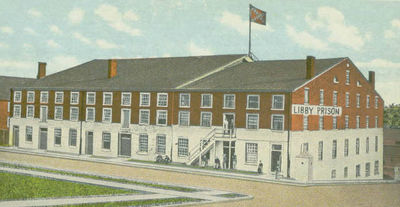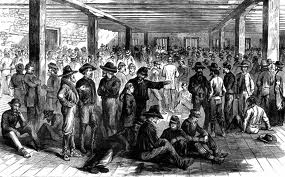Annotation:Libby Prison Quickstep: Difference between revisions
No edit summary |
m (Text replacement - "garamond, serif" to "sans-serif") |
||
| (2 intermediate revisions by one other user not shown) | |||
| Line 1: | Line 1: | ||
'''Back to [[{{BASEPAGENAME}}]]''' | =='''Back to [[{{BASEPAGENAME}}]]'''== | ||
---- | ---- | ||
<p><font face=" | <p><font face="sans-serif" size="4"> | ||
'''LIBBY PRISON QUICKSTEP.''' American, March (6/8 time). D Major. Standard tuning (fiddle). AABB'. The tune shares at least a first strain with "[[O Dear Mother My Toes are Sore (2)]]", "[[Jinny O Jinny My Toes | '''LIBBY PRISON QUICKSTEP.''' American, March (6/8 time). D Major. Standard tuning (fiddle). AABB'. The tune shares at least a first strain with "[[O Dear Mother My Toes are Sore (2)]]", "[[Jinny O Jinny My Toes are Sore]]," "[[Monongahela March]]," "[[Rustic Reel (1)]]," "[[Virginia Reel (3)]]," "[[First Western Change]]," "[[City Guards]]," and others. Libby Prison [http://en.wikipedia.org/wiki/Libby_Prison] was a notorious Civil War military prison in Richmond, Virginia, where captured Union Army soldiers were held, but it was not quite as infamous as the Confederate's Andersonville. It was located on the docks near the James River and prior to the war housed the merchant concerns of Capt. Luther Libby and his son George W. Libby. Some 1,000 prisoners were crowded into two floors of the warehouse structure, and overcrowding, disease, and poor nutrition took a large toll. | ||
[[File:libbyprison.jpg| | [[File:libbyprison.jpg|400px|thumb|left|Libby Prison]] | ||
<br> | <br> | ||
<br> | <br> | ||
</font></p> | </font></p> | ||
<p><font face=" | <p><font face="sans-serif" size="4"> | ||
[[File:libbyprison2.jpg| | [[File:libbyprison2.jpg|400px|thumb|right|The interior of Libby Prison]] | ||
''Source for notated version'': "Theo. B. Jobe, learned from a comrade while in Libby Prison in 1865" [Hopkins]. | ''Source for notated version'': "Theo. B. Jobe, learned from a comrade while in Libby Prison in 1865" [Hopkins]. | ||
<br> | <br> | ||
<br> | <br> | ||
</font></p> | </font></p> | ||
<p><font face=" | <p><font face="sans-serif" size="4"> | ||
''Printed sources'': Hopkins ('''American Veteran Fifer'''), c. 1905; No. 137. | ''Printed sources'': Hopkins ('''American Veteran Fifer'''), c. 1905; No. 137. | ||
<br> | <br> | ||
<br> | <br> | ||
</font></p> | </font></p> | ||
<p><font face=" | <p><font face="sans-serif" size="4"> | ||
''Recorded sources'': <font color=teal></font> | ''Recorded sources'': <font color=teal></font> | ||
</font></p> | </font></p> | ||
| Line 24: | Line 24: | ||
<br> | <br> | ||
---- | ---- | ||
'''Back to [[{{BASEPAGENAME}}]]''' | =='''Back to [[{{BASEPAGENAME}}]]'''== | ||
Latest revision as of 14:15, 6 May 2019
Back to Libby Prison Quickstep
LIBBY PRISON QUICKSTEP. American, March (6/8 time). D Major. Standard tuning (fiddle). AABB'. The tune shares at least a first strain with "O Dear Mother My Toes are Sore (2)", "Jinny O Jinny My Toes are Sore," "Monongahela March," "Rustic Reel (1)," "Virginia Reel (3)," "First Western Change," "City Guards," and others. Libby Prison [1] was a notorious Civil War military prison in Richmond, Virginia, where captured Union Army soldiers were held, but it was not quite as infamous as the Confederate's Andersonville. It was located on the docks near the James River and prior to the war housed the merchant concerns of Capt. Luther Libby and his son George W. Libby. Some 1,000 prisoners were crowded into two floors of the warehouse structure, and overcrowding, disease, and poor nutrition took a large toll.


Source for notated version: "Theo. B. Jobe, learned from a comrade while in Libby Prison in 1865" [Hopkins].
Printed sources: Hopkins (American Veteran Fifer), c. 1905; No. 137.
Recorded sources:
